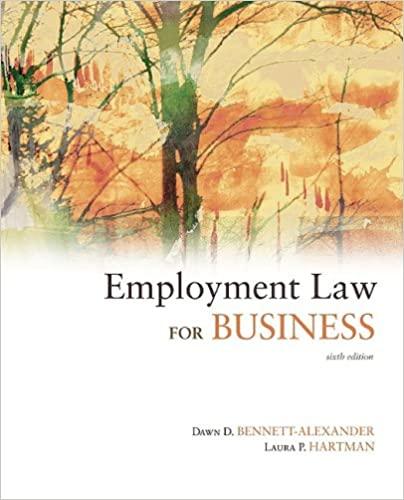Question
Post a response to the statement below. Forced arbitration clauses are contractual provisions that require individuals to resolve disputes with companies through arbitration rather than
Post a response to the statement below.
Forced arbitration clauses are contractual provisions that require individuals to resolve disputes with companies through arbitration rather than through the court system. Forced arbitration can affect the average employee by limiting their legal options, reducing transparency, potentially biasing the process in favor of the employer, restricting appeal rights, and preventing collective action. Employees may find themselves in a weaker position when seeking to address workplace disputes under forced arbitration clauses. Below are other ways employees are affected by forced arbitration.
1) Limited legal recourse: Forced arbitration clauses take away an employee's right to sue their employer in a court of law. Instead, employees are required to bring any disputes to arbitration, which is often seen as more favorable to companies than to individual employees.
2) Potential bias in favor of the employer: Arbitrators are often chosen and paid by the company, which can create a perception of bias in favor of the employer. This can make it harder for employees to win their cases or receive fair compensation in arbitration.
After doing some research I found that forced arbitration clauses are commonly used in a variety of contexts, including:
1) Employment agreements: Many employment contracts contain forced arbitration clauses that require employees to resolve disputes with their employers through arbitration rather than through the court system.
2) Employee handbooks and policies: Some companies include forced arbitration clauses in their employee handbooks or policies, requiring employees to arbitrate disputes related to their employment.
Forced arbitration clauses are used in a wide range of agreements across various industries and contexts to govern how disputes are resolved between parties. These clauses have the effect of restricting individuals' access to the court system and directing disputes to private arbitration proceedings.
Employers often use forced arbitration clauses in employment contracts for reasons like Cost savings, Confidentiality, Efficiency, Consistency and Avoidance of class-action lawsuits. While forced arbitration clauses can benefit employers in these ways, they can also be controversial due to concerns about fairness, transparency, and access to justice for employees. Critics argue that forced arbitration clauses can disadvantage employees by limiting their legal options and potentially favoring employers in dispute resolution. I don't agree with forced arbitration and believe that forced arbitration clauses can silence victims of systemic wrongdoing, prevent collective action to address widespread issues, and perpetuate a culture of secrecy that shields companies from public scrutiny. Overall, the practice of forced arbitration raises serious concerns about access to justice, due process, and the protection of individual rights, highlighting the need for greater scrutiny and regulation of this practice.
In earlier discussion questions I was interested in learning more about Discrimination and Harassment Laws. In Unit III study guide we read about Clarence Thomas and how he allegedly harassed Anita Hill on a regular basis over the course of 3 years. Knowing what is legal in the workplace is important. Something as simple as a joke can be taken the wrong way by a coworker or manager. Sexual harassment can be considered a form of discrimination when it targets an individual based on their gender or sex, perpetuating power dynamics and reinforcing harmful stereotypes. Both discrimination and sexual harassment can have profound negative effects on individuals, impacting their mental health, well-being, job performance, and overall sense of safety and belonging in the workplace.
Seedat, S. (2023). Staring into Voidness Courts Grapple with Arbitration Clauses in Tainted Contracts. South African Law Journal., Vol. 141(Issue 1), p143, 26p. https://doi.org/10.47348/SALJ/v141/i1a7
Arzandeh, A., & Hill, J. (2009). ASCERTAINING THE PROPER LAW OF AN ARBITRATION CLAUSE UNDER ENGLISH LAW. Journal of Private International Law, Vol. 5(Issue 3), p425-445.21p. https://doi.org/10.1080/17536235.2009.11424365
Step by Step Solution
There are 3 Steps involved in it
Step: 1

Get Instant Access to Expert-Tailored Solutions
See step-by-step solutions with expert insights and AI powered tools for academic success
Step: 2

Step: 3

Ace Your Homework with AI
Get the answers you need in no time with our AI-driven, step-by-step assistance
Get Started


